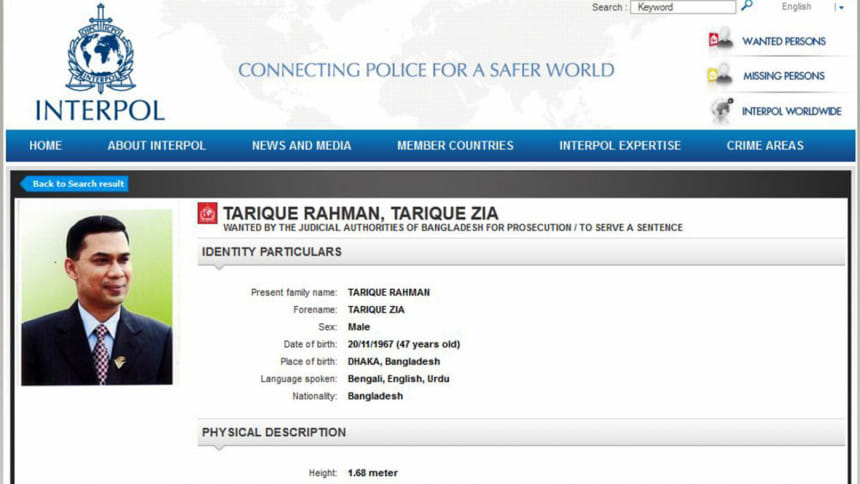Interpol may help countries arrest red alert persons

In response to an Interpol red notice, BNP leader Tarique Rahman can be arrested for extradition by the country where he is staying now.
“The individuals concerned are wanted by national jurisdictions (or International Criminal Tribunals, where appropriate) and Interpol’s role is to assist national police forces in identifying or locating those individuals with a view to their arrest and extradition,” Interpol press office said in a reply to an query from The Daily Star.
Interpol’s jurisdiction and mode of operation became a top talking issue across Bangladesh after reports yesterday on the publication of a red notice on the international police organisation’s website on Tarique in connection with the August 21, 2004 grenade attack on Awmai League rally that left 24 people dead.
“He is under the charge of murder and explosion of hand grenade in the Awami League meeting,” reads the charges posted on Interpol website.
Tarique Rahman, also the elder son of BNP chief and former PM Khaleda Zia, has been living in London since leaving the country in 2008 during the caretaker government rule. The United Kingdom is a member of Interpol.
Red notices – which according to Interpol website is: ‘To seek the location and arrest of wanted person with a view to extradition or similar lawful action’ – are one of the ways in which Interpol informs its 190 member countries that an arrest warrant has been issued for an individual by a judicial authority.
It is not an international arrest warrant, the press office says.
Red notices are only issued to Interpol member countries if the requesting National Central Bureau (NCB) has provided all the information required by the General Secretariat, and conforms with the organisation’s rules and regulations, it explains.
It further says: Interpol’s General Secretariat does not send officers to arrest individuals who are the subject of a red notice.
“Many of Interpol’s member countries however consider a red notice a valid request for provisional arrest, especially if they are linked to the requesting country via a bilateral extradition treaty. In cases where arrests are made based on a red notice, these are made by national police officials in Interpol member countries.
“Interpol cannot compel any member country to arrest the subject of a red notice,” it added.
Sources in Bangladesh police department said a request to trace and arrest Tarique Rahman was sent to Interpol about three months ago and Interpol recently issued the red notice on him.
“Interpol has nothing to do with the arrest or hand over of a fugitive. It is entirely the matter of a member country and its legal framework,” Assistant Inspector General of Police Mahbubur Rahman Bhuiyan, who is in-charge of the Interpol desk at police headquarters, told The Daily Star.
He said the matter of extradition of a fugitive also involves whether the countries involved have extradition treaty or not.
Nurul Huda, a former Inspector General of Police (IGP), said Interpol, responding to a request of a member country, can issue a red notice to find out a person who is chargesheeted in a case.
The NCB, the Interpol’s country office in Bangladesh, sent the request with all the required information following a request by the Criminal Investigation Department that is investigating the grenade attack case.
The legal body of the Lyon-based international police organisation takes decision on issuing red alert on the basis of the provided information about the fugitive.

 For all latest news, follow The Daily Star's Google News channel.
For all latest news, follow The Daily Star's Google News channel. 




Comments